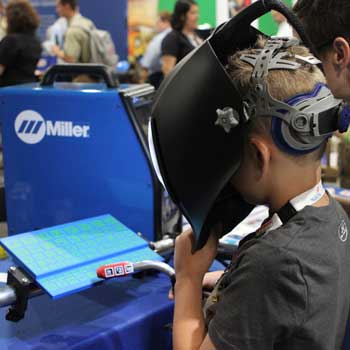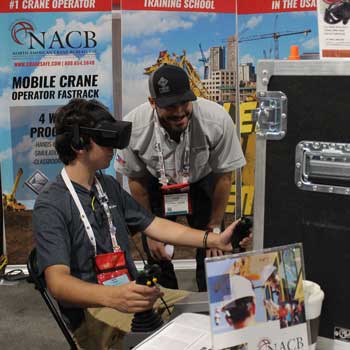Quick reflexes. A steady hand. Superb hand-eye coordination. A love for overcoming challenges.
These qualities describe many video game lovers. Whether they play on a console, PC, handheld or a VR system, gamers all enjoy the thrill of the virtual action and the satisfaction of winning the game or defeating the boss level.
Gaming is a popular hobby and entertainment activity, and many young people have an interest in turning that passion for video games into a career. But while careers in gaming have grown in recent years, not everyone will be able to become a game designer or popular streamer in such a competitive industry.
Luckily, gamers might find a special connection to a career path they may not have considered: Construction! From the skills it takes to the things you can make, a career in the building crafts can be a great way to unlock some real-world achievements.

From controllers to joysticks to the classic mouse and keyboard, all video games have some device that allows the game to control the action in the game.
To use these devices, gamers employ impressive amounts of sensorimotor skills, including muscle memory and coordination. In fact, studies show that video games can enhance these skills.
Just as a controller or mouse is a gamer’s tool, construction craft professionals use tools like hammers, saws, welding torches, trowels and many other types of equipment on a daily basis. And unsurprisingly, correct and efficient use of these tools require the same excellent sensorimotor skills that endless hours of playing Call of Duty or Fortnite can build up.
Did you ever think that slaying digital zombies might actually help you become a master carpenter or a precise millwright? While building a real house requires quite a bit more training than building a house in Minecraft, gaming can be a good start to a great career.
Some types of video games can offer additional benefits as well. Puzzle games like the Portal series or the ubiquitous Tetris help train the brain and develop spatial awareness and problem-solving skills. These talents can be critical on the job site – after all, construction is like the ultimate puzzle!
Training to work in construction is by nature much more hands-on than the more textbook-and-lecture-based education used to prepare students for other careers. But for some types of construction jobs, getting that hands-on training isn’t easy. Opportunities to learn with expensive tools, large equipment and lots of materials on a significant area of land can be limited by both accessibility and affordability.
Luckily, technology offers virtual training options that work much like a video game, including simulators and augmented reality.

If you’ve ever hopped in the seat of a racing game at an arcade, training technology like CM Labs’ Vortex simulators will feel natural. These simulators put you in the cabin of heavy construction equipment, such as cranes and excavators, and through the integrated joysticks and peddles you can operate the equipment while watching the digital display in front of you. Because practicing with the real things is such a challenge logistically, simulators offer opportunities that people interested in becoming heavy equipment operators would never normally have.
Virtual and augmented reality via headset displays is the next major jump in the world of gaming, and that same technology is benefiting career training as well. One great example of this implementation is Miller’s AugmentedArc welding simulator. Trainees don their “welding mask” which doubles as an AR headset and are able to see their own virtual welds come to life in front of them – and with no real sparks flying!
While simulators will never quite replace real hands-on training, they are becoming an important piece in helping trainees get comfortable and begin to understand key concepts of their craft while forming a connection between their future career and something fun and familiar like gaming.
The skilled crafts are an inherently creative and artistic industry. Craftspeople are able to bring thoughts and ideas to life with their own hands.
Video games are often a channel for imagination and creativity as well. Role-playing games allow gamers to create their own character and make their own adventure. Sandbox games like Garry’s Mod give the gamer a seemingly endless list of assets and functions that bestow the power to make new game modes or custom maps. City-builder games like SimCity or Cities: Skylines turn the player into a city planner, allowing them to build roads, zone districts, place buildings and otherwise manage their own virtual city.
For those who love to use games to scratch the creative itch: You can make a career out of it! Architects and engineers design buildings in both form and function. Carpenters build frames, walls, cabinets and even furniture out of wood, while masons create intricate stonework. Glaziers shape glass for windows, and painters add the finishing touches. Construction is art, and it’s all built with the hands of skilled craft professionals.
People might not naturally associate video games with construction, but gaming has a number of special connections to the industry. If you love video games, consider a career in the building crafts.